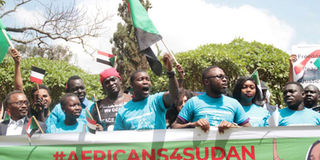Activists in Kenya teargassed at #Africans4Sudan protest

Human rights Activists during a peaceful demonstration in Nairobi in support of civilian rule and an end to killings in Sudan, June 19, 2019. PHOTO | SILA KIPLAGAT | NATION MEDIA GROUP
What you need to know:
- Among the activists who were arrested were Kenya Human Rights Commission (KHRC) Deputy Executive Director Davis Malombe and one Julius Kamau.
- The march aborted after law enforcers confronted the protesters and teargassed them.
- Several of them were arrested, briefly detained then released but Mr Malombe and Mr Kamau were held at Central Police Station as their colleagues sought their release, according to Florence Kanyua, a human rights activist and one of the organisers of the march.
- KHRC Executive Director George Kegoro warned that inaction by neighbouring countries will result in a serious refugee crisis.
Activists were arrested on Wednesday when police, for the second time, teargassed protesters in Nairobi as they marched to government offices to present a petition against its silence amid atrocities in Sudan.
Sudanese nationals have engaged in sustained protests in a demand for civilian rule following President Omar al-Bashir's ouster in April.
The Transitional Military Council took over but the people and several countries and international bodies have accused it of human rights violations.
Among the activists who were arrested were Kenya Human Rights Commission (KHRC) Deputy Executive Director Davis Malombe and Julius Kamau.
The peaceful demonstration was to begin at 9am at Freedom Corner in Uhuru Park, with protesters marching through Kenyatta Avenue, Kimathi Street, Moi Avenue and Harambee Avenue before gathering at the Ministry of Foreign Affairs for presentation of the petition.
They were then to proceed to Parliament Buildings and the Office of the President.

Human rights activists are pictured during a protest in Nairobi on June, 19 2019, as part of efforts to help end atrocities in Sudan, where the people are demanding civilian rule. PHOTO | SILA KIPLAGAT | NATION MEDIA GROUP
PERMIT
The demonstrators were first teargassed at Freedom Corner but they stayed put so police allowed them into the central business district.
The march aborted after law enforcers confronted the protesters at the General Post Office (GPO) and teargassed them.
Several of them were arrested, briefly detained then released but Mr Malombe and Mr Kamau were held at Central Police Station as their colleagues sought their release, according to Florence Kanyua, a human rights activist and one of the organisers of the march.
“We congregated as had previously been planned but police soon arrived demanding to see our notification for the march," said Ms Kanyua.
"They had earlier been notified about our march and had even granted us a permit. I personally submitted copies of the permit to the relevant security agencies, so I showed it to them too."

Human rights activists displays signs for peace in Sudan during a protest against atrocities that have followed the ouster of President Omar al-Bashir and a takeover by the military. PHOTO | SILA KIPLAGAT | NATION MEDIA GROUP
TEARGASSED
Ms Kanyua said police looked at the notice but noted that they had been ordered to bar the protesters from holding activities at locations other than Freedom Corner.
“A policewoman even told us to talk to the Parliament Police Station OCS if we wanted to proceed with our march. That did not happen as they suddenly hurled teargas canisters at us,” she said.
KHRC Executive Director George Kegoro they gathered to protest the killing of civilians by Sudanese security forces after a clampdown on a sit-in outside the army headquarters in Khartoum.
“We are concerned that African leaders are silent regarding what is happening in Sudan because it has direct ramifications for the region. If things go on as they are at the moment, there could be a big refugee crisis that could affect the entire region," said Mr Kegoro.
“South Sudan has problems ... Sudan's stability enabled some level of stability in South Sudan. [With both of them unstable] there will be the movement of people who feel insecure to the borders of Kenya and Uganda.”
Ms Kanyua said police were also looking for Mr Kegoro.

An activist displays a sign for peace in Sudan during a protest against atrocities that have followed the ouster of President Omar al-Bashir and a takeover by the military. PHOTO | SILA KIPLAGAT | NATION MEDIA GROUP
DEMANDS
The protest promoted under #Africans4Sudan and #IAmTheSudanRevolution was organised by human rights activists from groups including the KHRC, PAWA254 and InformAction.
Last week, activists held a night vigil at the KenCom bus stop in the Nairobi town centre but were teargassed by police.
The heads of the Sudanese military were to form a Transitional Military Council to last six months and return the country to civilian rule via a democratic election.
They have, however, reneged on their promise to the people and instead drafted a 50-50 power sharing agreement between the civilians and the military.
This has forced the people to continue with their protests, leading to action by security forces that have killed more than 30 and wounded many.
The Nairobi demonstrators demanded a government of the people, by the people and for the people.
“We wish to send a strong message to the military council that power ultimately belongs to the people. The Sudan military must follow its own laws and the Constitution," they said in their statement.
“At the moment the Sudan military is in total disregard of the United Nations Declaration on Human Rights, which Sudan is a signatory to. We demand an immediate stop to this senseless massacre of peaceful protesters who are only exercising their right to good governance.”





